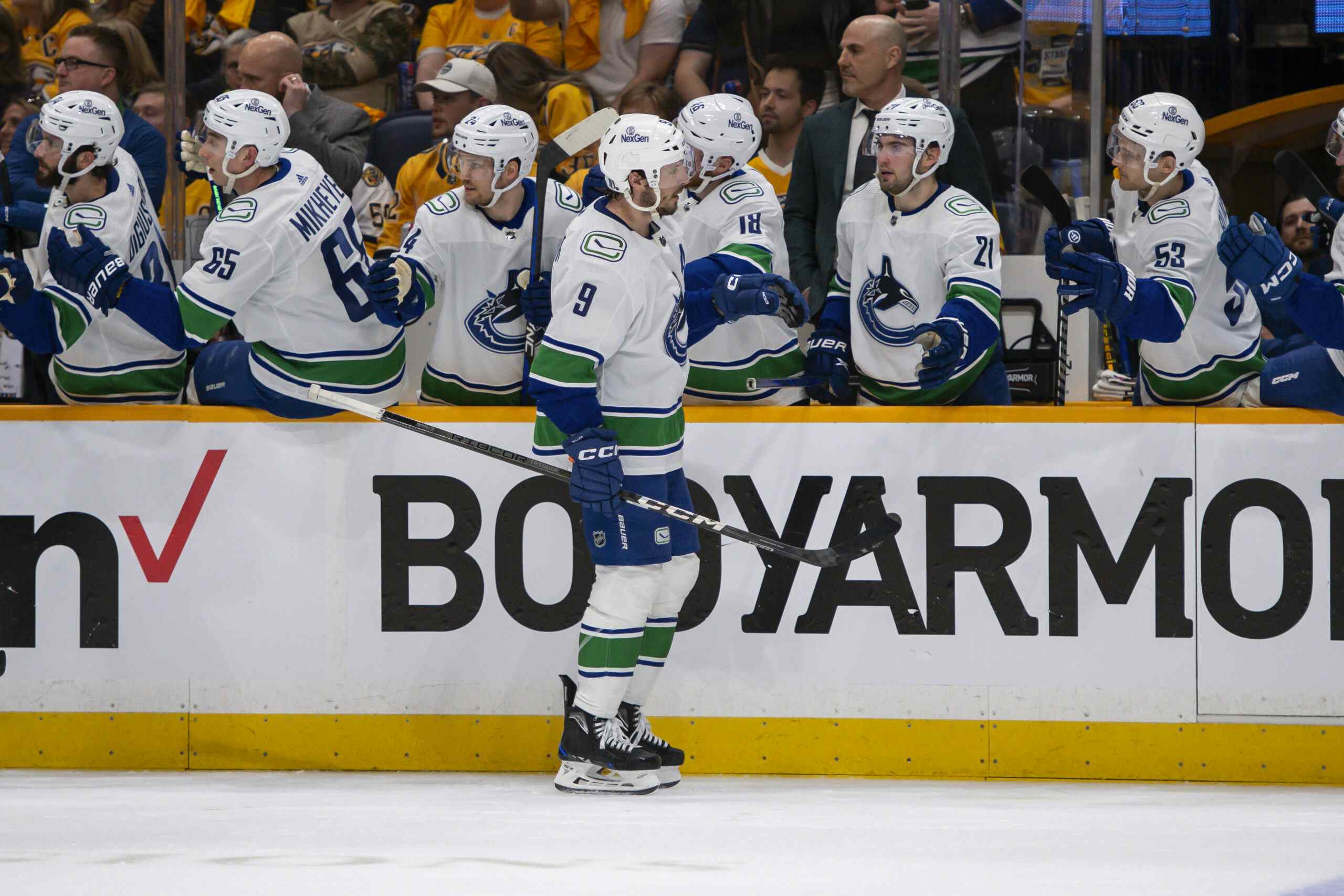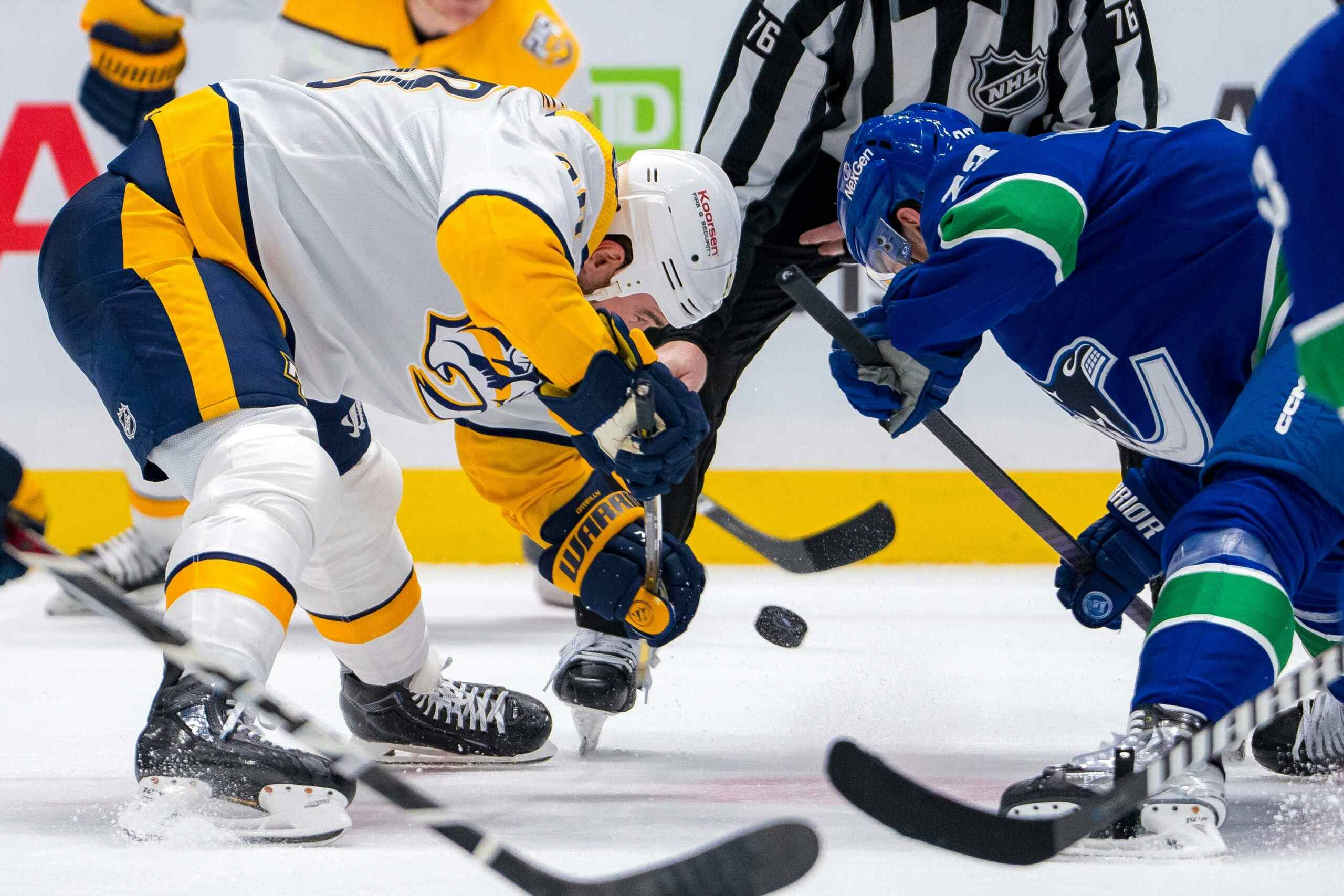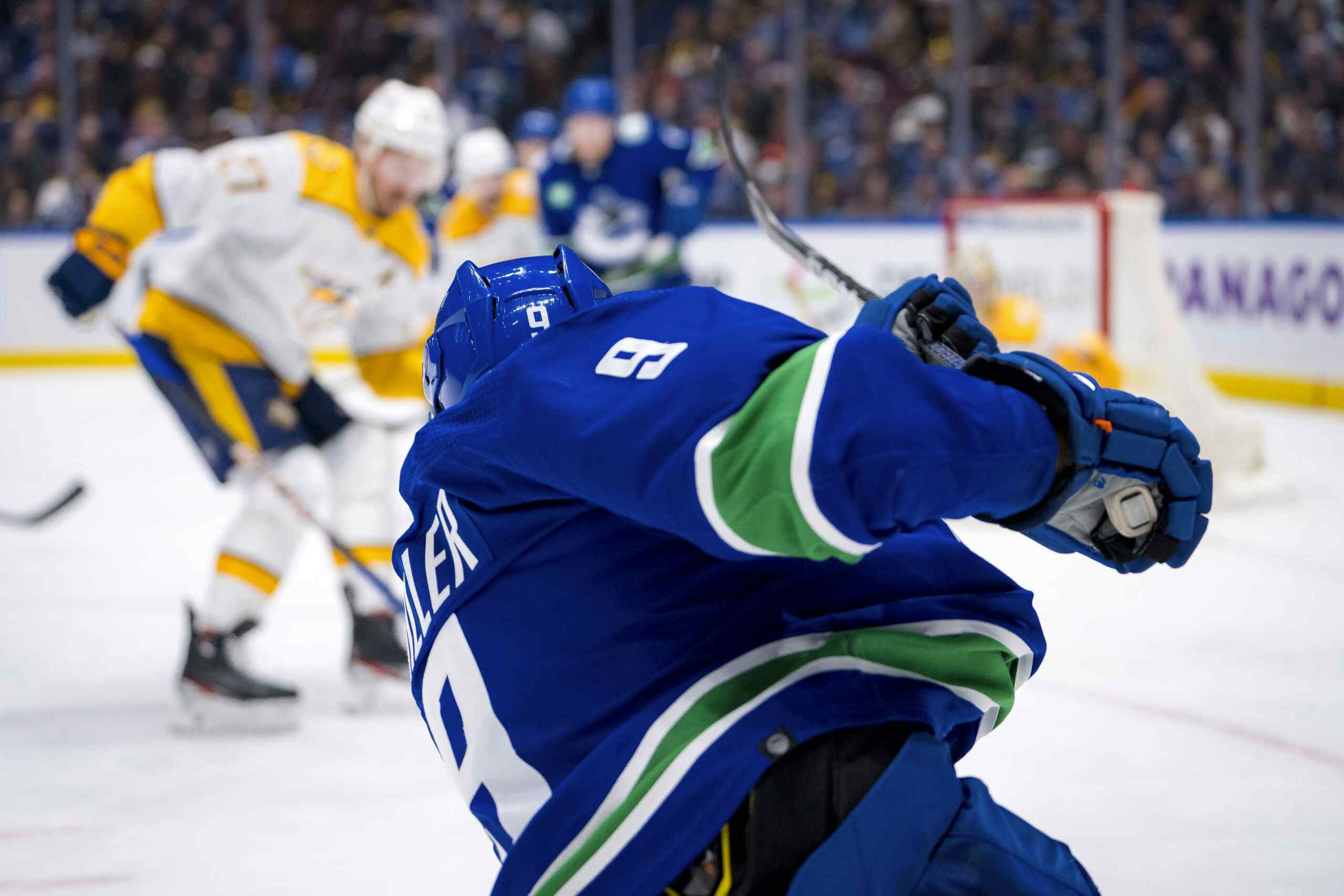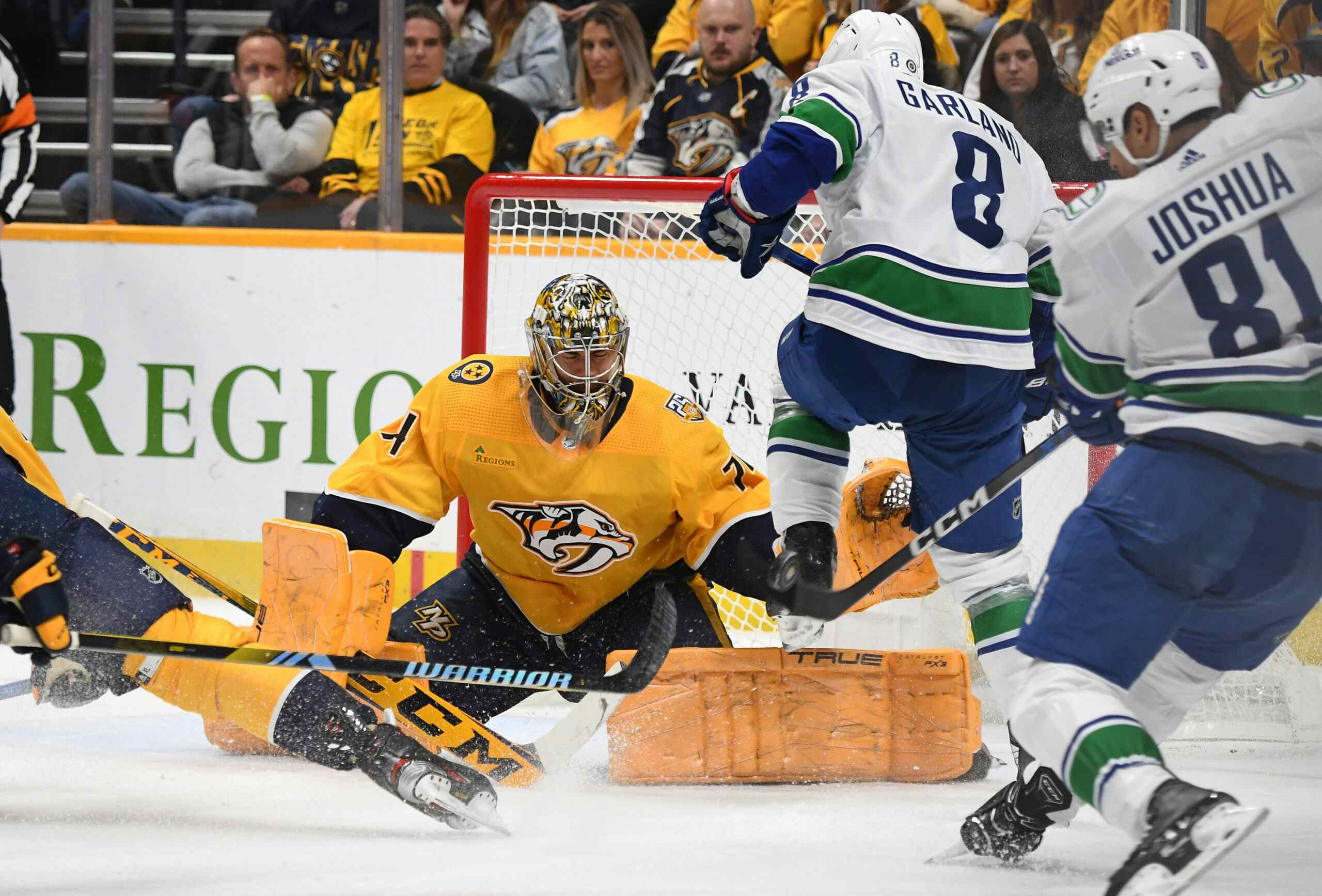On Negativity
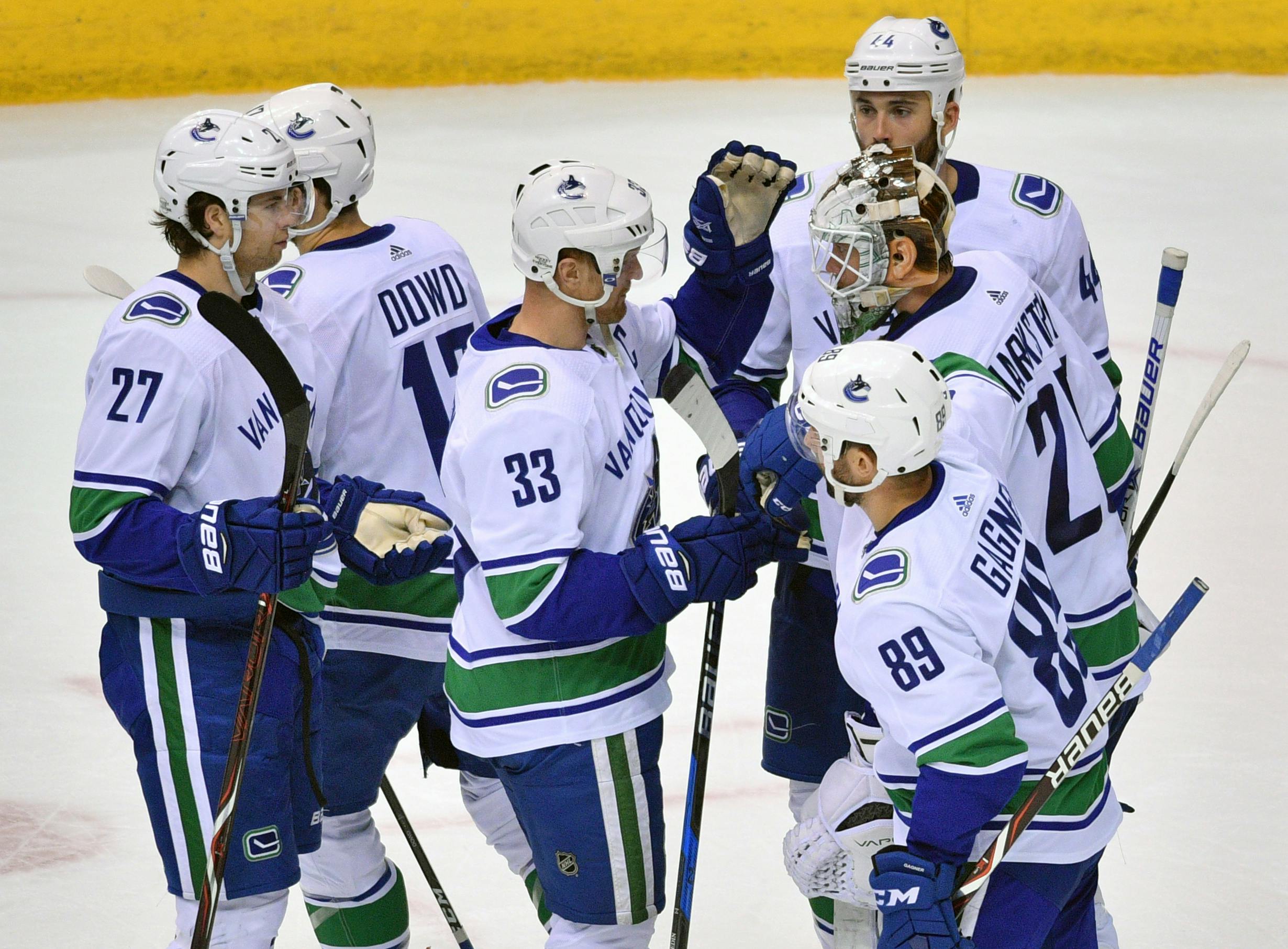
6 years ago
Listen: Elliotte Friedman made some comments about the Vancouver hockey market, and it made a lot of people very upset. (If you’ve somehow missed it. you can listen here.)
It’s been discussed ad nauseam, I’ll admit, but there’s more that ought to be said.
For those that can’t be bothered to click, here’s the gist: Vancouver is a tough market. The negative attitude here takes its toll on the executives and their families. Maybe it’s fair to speculate that it’s had an effect on the on-ice product, either by influencing front office decisions or by scaring away potential free agents.
I’d like to keep the focus off of Friedman as much as possible. Mostly because I think media gossip is a lot less interesting to the average fan than many of us think it is, and also because I think he’s just expressing an honest sentiment that many in this market share. The idea that the Vancouver commentariat is too negative has been around as long as I can remember, and the sentiment that it negatively affects the team has been brewing for some time.
Just look at some of these comments, and the upvote counts.

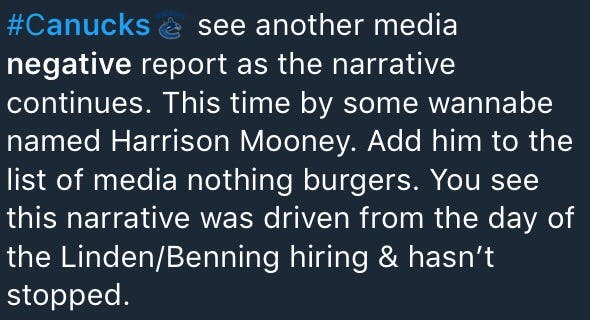
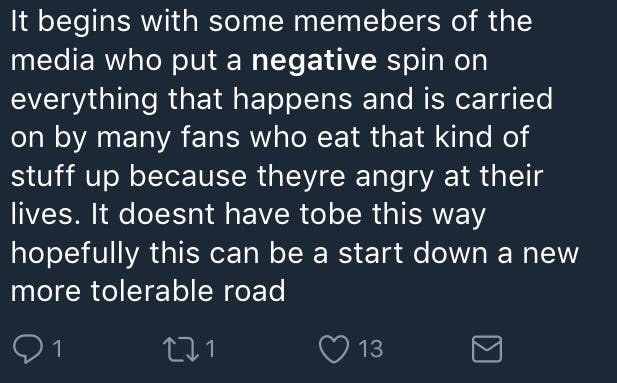
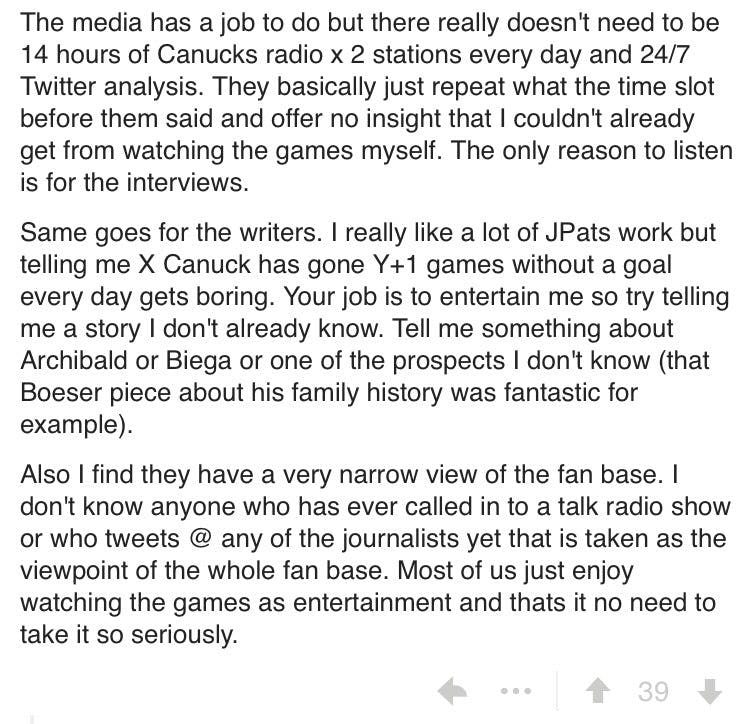
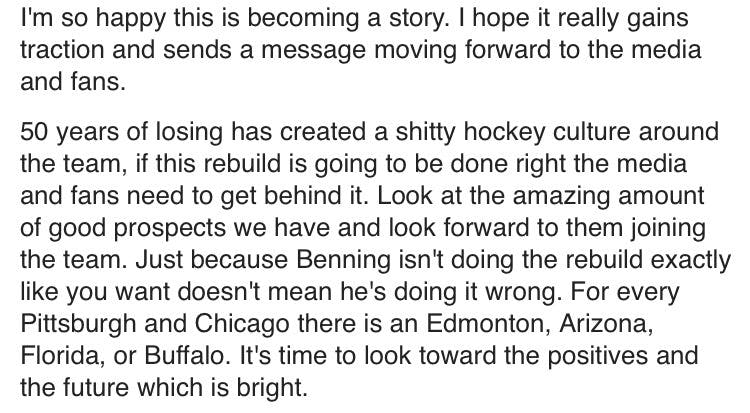
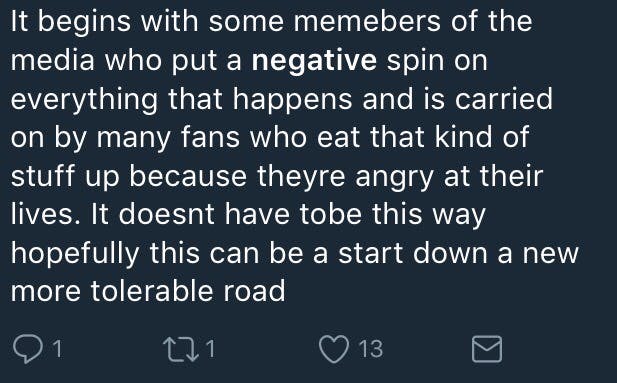
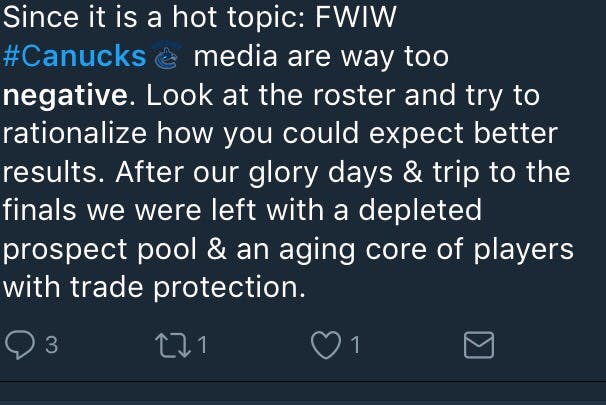
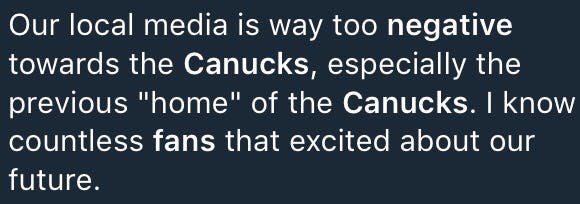
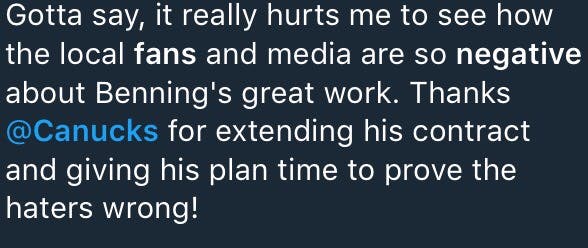
There’s evidence to suggest it reflects how the front office feels, too. No, I’m not talking about the asinine suggestion that Friedman is carrying water for the Canucks. (Friedman gave a humourously sarcastic nod to the conspiracy theories on last night’s broadcast. Say what you will about his comments, but at least he has a sense of humour.) I’m talking about the team president’s comments:
“Every time we do something, there’s a reaction. It’s more times bad than good. But, hey, it is what it is.”
To their credit, Linden and Benning have actually taken the criticism in stride for the most part. There’s a lot to pick apart when looking at their track record, but they’ve shown relatively thick skin. This is reflected in another of Linden’s comments:
“I’ve been here since 1988 as a player. I’ve been scrutinized as a player. I’ve been scrutinized in this role (as president). It’s a Canadian market. People care. They’re passionate. I knew what I was getting into.”
If you look at the history of the market and the organization and hear someone suggest it’s been toxic at times, you’ll quickly see that that idea scans. When the team was at its height, the fans and the media could be very tough on the team. On the media side of things, the coverage of the goalie situation got particularly ugly. The fans get in on the action, too. It’s not often you see fans stage protests outside the arena, or to start chants calling for the GM’s head. And of course, there were the riots.
Now, as ugly as things could be, the coverage from media outside the city took the cake. But that’s a story for another time. The point is, it’s not like the criticisms of the overall attitude in the market came out of nowhere.
Now, with that out of the way, I think it’s more than fair to point out that there are a couple of holes in the sentiment that the market is even partially to blame for the team’s failings.
Context is one.
For five years, the team has been bad. It’s been in desperate need of a rebuild. With the exception of the mirage that was the 2014-15 season, they’ve been a bottom-of-the-league organization.
For the most part, the market has been patient.
There will always be naysayers, but part of an NHL executive’s job is to tune out the noise.
Last year’s deadline was heralded. Many believed Trevor Linden and Jim Benning had finally learned from their mistakes and were changing gears. The market might be in for some painful years, but the decision to jettison two respected veterans and the assets they got in return suggested management had what it takes to do what was right for the long-term health of the franchise.
There was euphoria surrounding the draft. They swung for the fences on all but one of their picks.
They went a little veteran-heavy in free agency, but you could convince yourself this was to give the organization the opportunity to move out other pieces in exchange for futures. Suddenly it looked like the front-office might be adapting to a changing game, and looking at getting more creative and savvy with their roster construction.
The last few weeks put an end to all those fanciful ideas. The general manager was extended. Even with the long history of questionable decisions, the extension was defensible given the recent track record.
The last week, however, was genuinely puzzling. The organization’s moves were utterly at odds with the philosophy of the past year. Actions speak louder than words. The Gudbranson extension (and decision to forego the futures the team would have received by trading him) and the players targeted at the deadline seemed to say to the market, “We extended the general manager because of all the great things he’s done this year; but we’re not going to continue in that well-received direction. Instead, we’re going back to a poorly received direction that involves doing what didn’t work in the two previous seasons.”
The idea that the response to the Thomas Vanek situation from fans in the aftermath of the deadline is actually a reflection of residual anger about past decisions hasn’t gotten nearly enough play in the past day or two. Gudbranson was far and away the team’s best trade chip, and taking him off the market increased the pressure to get a Vanek deal done. It also increased the pressure to get a good return. It wasn’t unreasonable for fans to look at the deals the team signed in the summer and the pack of moveable veterans and predict the team could enter the 2018 draft with eight or nine picks. Instead, they lost one in the Derrick Pouliot trade and added a couple of reclamation projects in their mid-twenties. The team’s recent history is littered with those types of players, and many didn’t work out. Heading into the summer in the NHL’s basement with six picks in the upcoming draft isn’t something that’s going to make sense to fans, especially when the team’s draft record has been so well-received overall. So really, the reaction isn’t about Motte or Vanek. It’s about a body of work that looks uninspiring.
For years, the fans in this market have heard they can’t handle a rebuild. The team’s own management has gone so far as to make this implication. They’ve responded by keeping the arena 80-90% full on most nights.
When you look at the team’s bottom line — the only thing that really matters — it’s hard to come away thinking the fans aren’t supportive enough. And if the media is on a crusade to turn fans against the team, it hasn’t worked. Not in any tangible, meaningful sense.
Yes, the fans can be critical; but they buy the product. Ticket sales are strong for an awful team in an ostensibly fickle market. In no other industry is it considered unfair for consumers to criticize a product they spend hundreds of dollars a year on.
Managing a hockey team can be a hard job. It’s stressful. The travel is tough. Family time is limited, and the hours are crazy. Sometimes, executives may feel unfairly maligned. But let’s put a notion to bed right now: not a single NHL GM should feel put-upon.
Contrast that to the fans. Hockey is rightly seen as a sport for rich folks; but concerning fandom, it still has a notable working-class contingent. There are fans in this market that work long hours, make very little money, and are feeling squeezed by a skyrocketing cost of living. For those people, following the Canucks is a way to wind down. An escape, even. By and large, those fans are still invested. They still tune in at 7 pm to watch their team get pummelled, and a few of them even scrounge up the cash to see it happen live and in real-time. Painting comments about the fans being the problem in Vancouver as class warfare feels a tad hyperbolic, I’ll admit; but the implication that the fans that buy the product the millionaires in the front office are peddling need to be more considerate about their feelings doesn’t sit right with me.
There’s a quote from my favourite author, Kurt Vonnegut, which I’m reminded of:
“America is the wealthiest nation on Earth, but its people are mainly poor, and poor Americans are urged to hate themselves… Every other nation has folk traditions of men who were poor but extremely wise and virtuous, and therefore more estimable than anyone with power and gold. No such tales are told by the American poor. They mock themselves and glorify their betters.”*
Vonnegut was talking about the American working class, but I think there’s still a parallel to be drawn here. Obviously, the Venn diagram of working-class Vancouverites and Canucks fans is not a perfect circle. I have all the time in the world for discussions about how the Canucks’ poorest fans have been squeezed out of the arena experience, but unfortunately, that would be too long of a digression in this instance. The prescriptive element of what Vonnegut was discussing is that last sentence. There is absolutely a large community of fans in this market who, when confronted with a team that’s languished in the league’s basement for the better part of half a decade, blames the fan community for not being supportive enough. According to them, the organization is fighting a losing battle because the market is impossible to please.
There’s a sentiment that exists in all facets of journalism, (not just the inconsequential realm of sports,) that assumes that if you don’t find yourself straight down the middle of every issue, you must have a bias. The reality is that not every issue has two equal sides. When things aren’t going well, and it’s hard to find a positive angle, that’s going to be reflected in the coverage. As bad as things have gotten, we’ve got a ways to go before the newspapers start calling for heads in the manner that we’ve seen from other Canadian markets.
At the end of the day, though? As far as the media is concerned, I’m sure they can take the heat. It’s part of the job. They’ll always hear that they’re too negative. And if the last 24 hours are any indication, they’re also ready, willing, and able to defend themselves.
The fans, on the other hand, can and should say whatever they want. The media and the organization would all be out of a job if not for them.
Don’t bite the hand that feeds.
*It’s not Whitman, but it ought to count for something.

